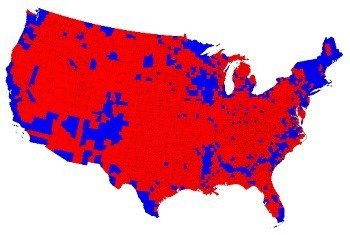Does 2016 have only one Top1c? (Nov 10)

How to make sense of Donald Trump’s election? Here are some articles which helped me. Maybe they’ll help you.
“We country folk are programmed to hate the prissy elites. That brings us to Trump”
How Half Of America Lost Its F**king Mind is a brilliant piece on the urban-rural cultural divide, written by someone who grew up in the rural Sea of Red and migrated to the Big (Blue) City. As an Australian, where this divide is also very strong, this rings true to me.
It is, amazingly, also the only piece I’ve read on the topic. However, there have been several others also challenging the idea of a mobocracy, notably Donald Trump and the Myth of Mobocracy.
See also: 33 resources tagged Trump on my Hub.
“Two convergent trends are making populism a potent negative force”
One of several academics writing for The Conversation in We the People: the charms and contradictions of populism, Christine Milne nails it:
Two convergent trends are making populism a potent negative force
- First, democracies have morphed into unrepresentative plutocracies that lead growing numbers of people to feel shut out and voiceless…
- Media … business model is now based on social media and clicks, not facts. Clicks depend on theatrical performance, stunts, celebrity, entertainment and conflict. The combination of clicks with filter bubbles… produces serious distortion. Truth and facts now mean what the populist chooses them to mean… Overcoming populism … also requires factual, public interest journalism
My emphasis. Because if you’ve read anything from me, you might have noticed an obsession with the twin threat to democracy from filter bubbles and the decline of media business models. Here’s some more:
if you study the dynamics of how information moves online today, pretty much everything conspires against truth…
- How the Internet Is Loosening Our Grip on the Truth (NYTimes)
“Segregated social universes, an industry moving from red states to the coasts, and mass media’s revenue decline… I used to be something of a skeptic when it came to claims of “filter bubbles” … But I’ve come to think that the rise of fake news… has weaponized [them]” - The forces that drove this election’s media failure are likely to get worse (Nieman Lab)
“decline of stable platforms of production and social-media-driven feedback loops enfeeble … a “common public agenda”… can lead to unexpected and potentially destabilizing behavior in politics and markets…. “
- Study: Decline of traditional media feeds polarization (CJR)
a research paper … matched the attitudes of those who did and did not have broadband with data on partisan hostility… found depressing proof that the web is fuelling segregation”
- Did better broadband make Americans more partisan? (Guardian)
See also: There are 65 posts tagged filter bubble and 349 tagged media (good luck with that!).
Brexit: “The parallels are overwhelming”
The parallels with Brexit, of course, are obvious to everyone. If I had to pick out three of the resources tagged Brexit:
“Cognitive ease is the concept of which when you hear something repeatedly, your brain starts to form connections around it, thus making it easier for you to process later.”
- The problem with cognitive ease and news (Baekdal)
“both Brexit and Trumpism are the very, very wrong answers to legitimate questions that urban elites have refused to ask for 30 years“
- Democrats, Trump, and the Ongoing, Dangerous Refusal to Learn the Lesson of Brexit (The Intercept)
“voters feel let down by the BBC’s coverage being hampered by impartiality rules… we are entering, as the Americans seem to have entered, an era of identity politics”
- Media should rethink coverage in wake of Brexit vote (Guardian)
See also: 65 posts tagged psychology, another 11 tagged identity
Blogplug
Since my last enewsletter I’ve written about filter bubbles and media a little myself:
- All hail the Trump-o-Meter, above, was a modest suggestion for fact-checking - a technique which, as the above Nieman article pointed out, was very much in evidence in this campaign, for all the good it did
- How to lie terrifyingly well on social media takes a quick look at why blatant misinformation spreads on social media, and how you can avoid falling for it
- Storytelling and Branded Reality in the Internet of Experiences (and Trump’s Republican Party) takes a look at what happens to ‘facts’ when the next media technological revolution comes
As well as on Brexit:
Related reading
More Stuff I Think
More Stuff tagged media , populism , psychology , newsletter , identity , trump , filter bubble
See also: Psychology , Social Web , Media , Politics